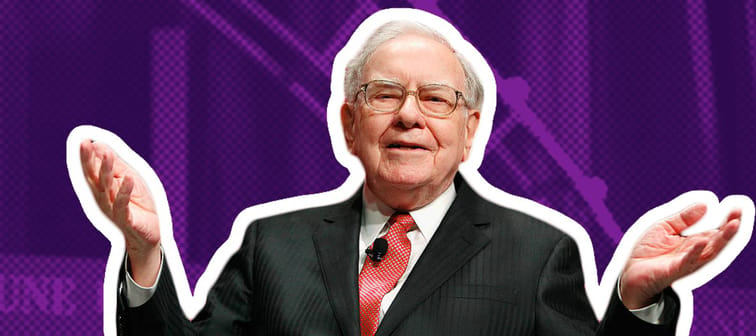1. Selling put options
You’d think that someone like Buffett who seems devoted to blue-chip stocks would steer clear of complicated derivatives, but you’d be wrong.
Throughout his investing career, Buffett has capitalized on the advanced options-trading technique of selling naked put options as a hedging strategy. In fact, in Berkshire Hathaway’s 2007 annual report, the company acknowledged that it had 94 derivative contracts, which over the year generated $7.7 billion in premiums.
This strategy involves selling an option where you promise to buy a stock at a specific strike price below its current value sometime in the future. This immediately gives you money from the sale of the option. If the share price doesn’t fall, you keep the money.
If the price does fall below the strike price, you purchase the stock at a price that’s less than you would have paid at the time you sold the option, with the cash from the option sale further reducing your cost. The buyer of the option profits because they’ll buy the stock at less than your strike price, then force you to buy it.
The option is considered “naked” because you haven’t secured another option to buy the stock, such as shorting shares of that same stock to offset your purchase cost.
But keep in mind that this given the risk involved, this isn’t something a newbie investor should try on their own.
“You will recall that in our catastrophe insurance business, we are always ready to trade increased volatility in reported earnings in the short run for greater gains in net worth in the long run,” Buffett wrote in his 2007 report. “That is our philosophy in derivatives as well.”
More: Buffett's 3 top stocks to fight inflation
Meet Your Retirement Goals Effortlessly
The road to retirement may seem long, but with WiserAdvisor, you can find a trusted partner to guide you every step of the way
WiserAdvisor matches you with vetted financial advisors that offer personalized advice to help you to make the right choices, invest wisely, and secure the retirement you've always dreamed of. Start planning early, and get your retirement mapped out today.
Get Started2. Investing in small-cap stocks
When you’re throwing around the kind of cash that’s measured in billions, scooping up shares of promising emerging companies won’t work. Shares of small-cap growth stocks of companies typically worth $300 million to $2 billion would simply move too much if the Oracle of Omaha made a purchase that was big enough to make it worth his while.
“I have to look for elephants,” Buffett once said in discussing his investment options. “It may be that the elephants are not as attractive as the mosquitoes. But that is the universe I must live in.”
One reason those so-called “mosquitoes” are attractive is because shares demonstrate the most growth in the early days of a company's operation. But just because those little outfits are off-limits to Buffett doesn’t mean you can’t go after them.
3. Cutting losses when necessary
Buffett’s “buy and hold” approach doesn’t extend to never admitting that even he sometimes gets it wrong. Once losses set in at a well-managed company, that’s a sign that the economics of that business may have changed in a way that’s going to create losses for a long time to come.
As for Buffett, his big misstep was airline companies. Berkshire Hathaway once owned a stake in all four major American airlines: Delta, American Airlines, Southwest and United. While he only added these companies to his roster in 2016, by the end of 2020, he’d dropped them all — at a loss.
Buffett took responsibility for the failed strategy, but was clear he didn’t see a future in airlines and even went so far as to call the industry a “bottomless pit.”
“We will not fund a company that — where we think that it is going to chew up money in the future,” he said at the time.
Sponsored
Follow These Steps if you Want to Retire Early
Secure your financial future with a tailored plan to maximize investments, navigate taxes, and retire comfortably.
Zoe Financial is an online platform that can match you with a network of vetted fiduciary advisors who are evaluated based on their credentials, education, experience, and pricing. The best part? - there is no fee to find an advisor.







